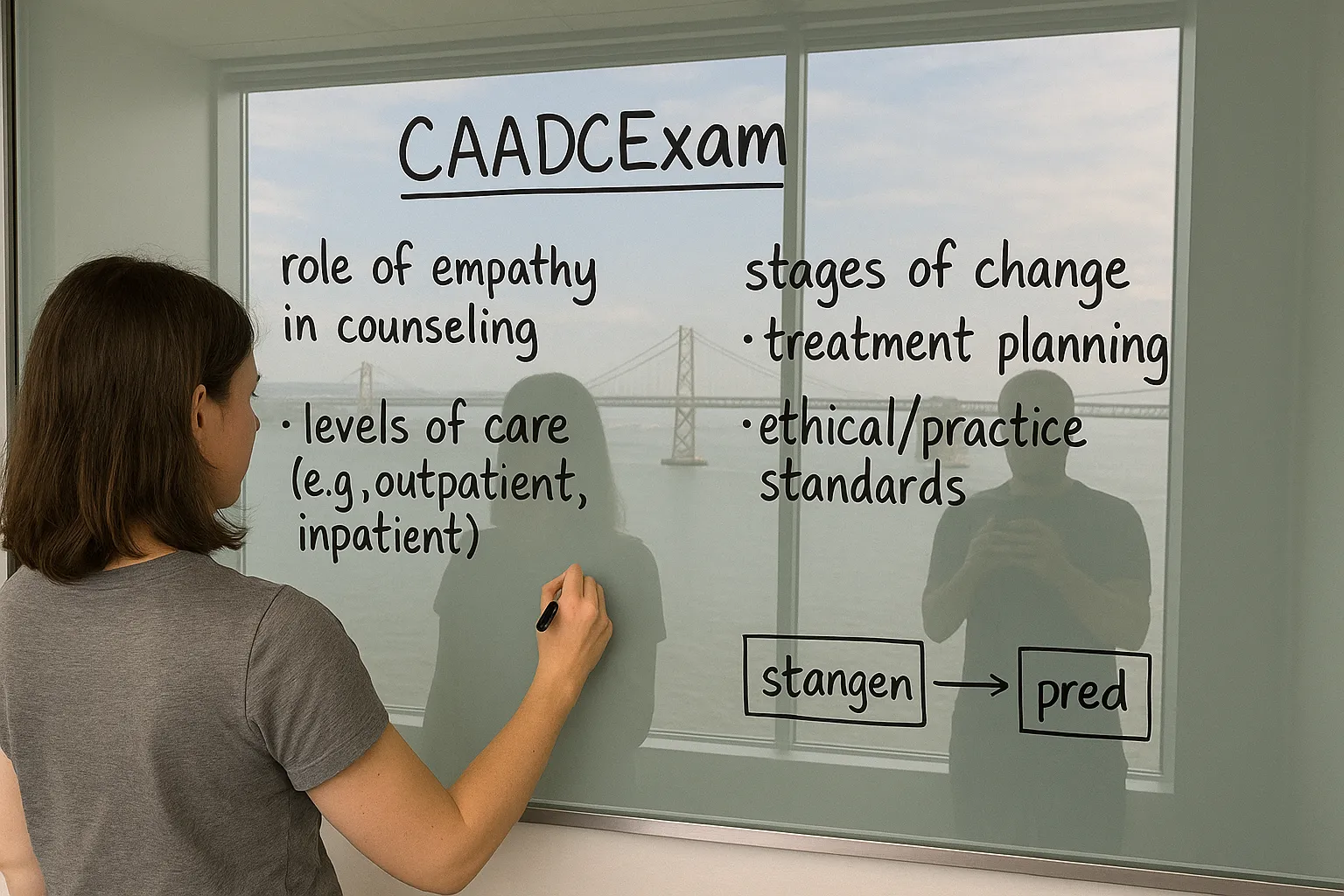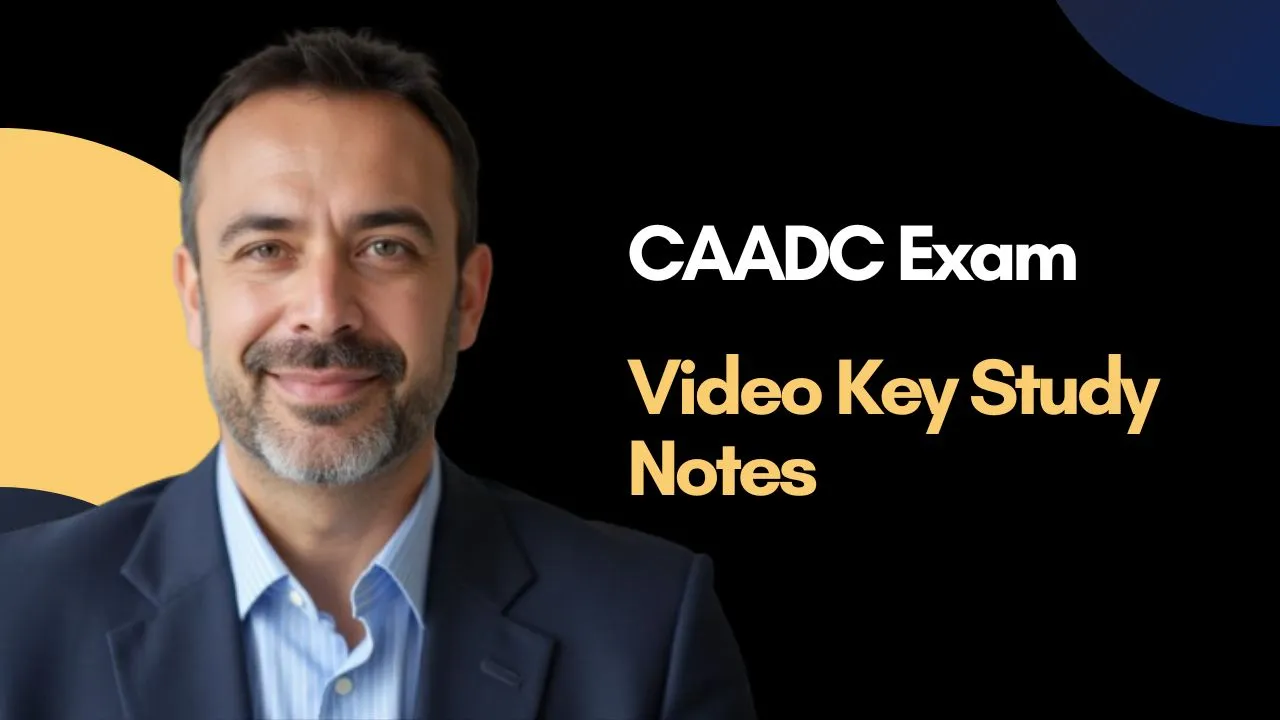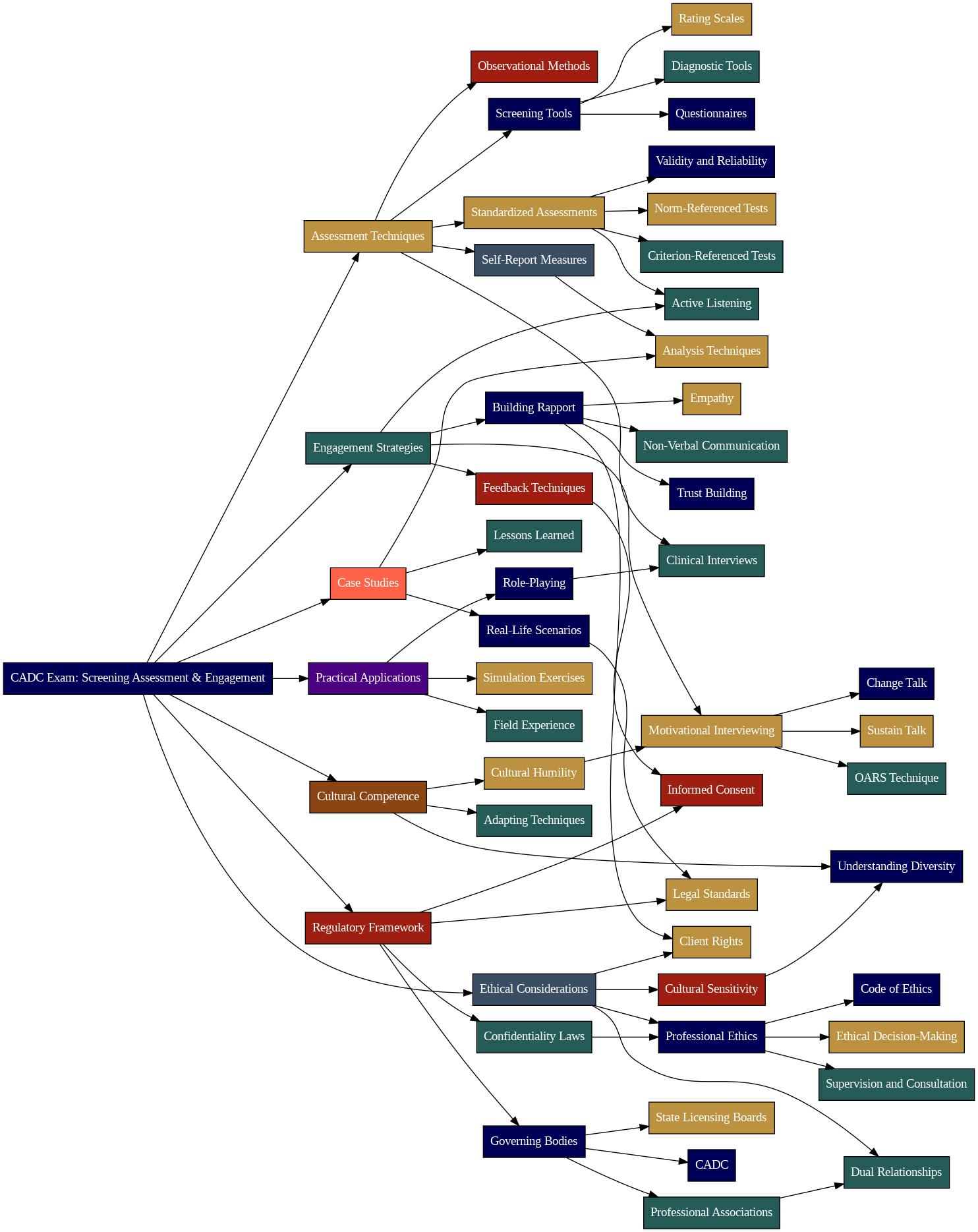Quiz-summary
0 of 29 questions completed
Questions:
- 1
- 2
- 3
- 4
- 5
- 6
- 7
- 8
- 9
- 10
- 11
- 12
- 13
- 14
- 15
- 16
- 17
- 18
- 19
- 20
- 21
- 22
- 23
- 24
- 25
- 26
- 27
- 28
- 29
Information
Premium Practice Questions
You have already completed the quiz before. Hence you can not start it again.
Quiz is loading...
You must sign in or sign up to start the quiz.
You have to finish following quiz, to start this quiz:
Results
0 of 29 questions answered correctly
Your time:
Time has elapsed
Categories
- Not categorized 0%
- 1
- 2
- 3
- 4
- 5
- 6
- 7
- 8
- 9
- 10
- 11
- 12
- 13
- 14
- 15
- 16
- 17
- 18
- 19
- 20
- 21
- 22
- 23
- 24
- 25
- 26
- 27
- 28
- 29
- Answered
- Review
-
Question 1 of 29
1. Question
Imani, a client in Indiana, becomes increasingly agitated during a counseling session, expressing feelings of hopelessness and anger. Her voice is raised, and she begins pacing the room. As an LCAC, which of the following is the MOST appropriate initial response?
Correct
The question focuses on the Indiana LCAC’s understanding of crisis intervention techniques, specifically de-escalation strategies, and their application in a scenario involving a client exhibiting heightened emotional distress. Crisis de-escalation aims to reduce the intensity of a crisis situation and prevent it from escalating further. Effective de-escalation techniques involve creating a safe and calm environment, actively listening to the individual’s concerns, validating their feelings, and offering support and reassurance. In the scenario, a client, Imani, becomes increasingly agitated during a counseling session, expressing feelings of hopelessness and anger. Her voice is raised, and she begins pacing the room. Challenging Imani’s feelings (“You’re overreacting; things aren’t that bad”) would likely escalate the situation by invalidating her emotions and creating a confrontational dynamic. Ignoring Imani’s behavior and continuing with the planned session would fail to address her immediate distress and could lead to further escalation. Immediately initiating a 72-hour hold without attempting de-escalation would be a premature and potentially traumatizing intervention. The most appropriate response is to acknowledge Imani’s feelings, create a safe space, and attempt to de-escalate the situation (“Imani, I can see that you’re feeling incredibly overwhelmed right now. Let’s take a moment to breathe and talk about what’s happening.”). This approach validates Imani’s emotions, establishes a connection, and offers an opportunity to explore the underlying issues contributing to her distress. It allows Imani to feel heard and understood, which can help to reduce her agitation and promote a sense of safety and control.
Incorrect
The question focuses on the Indiana LCAC’s understanding of crisis intervention techniques, specifically de-escalation strategies, and their application in a scenario involving a client exhibiting heightened emotional distress. Crisis de-escalation aims to reduce the intensity of a crisis situation and prevent it from escalating further. Effective de-escalation techniques involve creating a safe and calm environment, actively listening to the individual’s concerns, validating their feelings, and offering support and reassurance. In the scenario, a client, Imani, becomes increasingly agitated during a counseling session, expressing feelings of hopelessness and anger. Her voice is raised, and she begins pacing the room. Challenging Imani’s feelings (“You’re overreacting; things aren’t that bad”) would likely escalate the situation by invalidating her emotions and creating a confrontational dynamic. Ignoring Imani’s behavior and continuing with the planned session would fail to address her immediate distress and could lead to further escalation. Immediately initiating a 72-hour hold without attempting de-escalation would be a premature and potentially traumatizing intervention. The most appropriate response is to acknowledge Imani’s feelings, create a safe space, and attempt to de-escalate the situation (“Imani, I can see that you’re feeling incredibly overwhelmed right now. Let’s take a moment to breathe and talk about what’s happening.”). This approach validates Imani’s emotions, establishes a connection, and offers an opportunity to explore the underlying issues contributing to her distress. It allows Imani to feel heard and understood, which can help to reduce her agitation and promote a sense of safety and control.
-
Question 2 of 29
2. Question
Jamal, an LCAC in Indiana, is working with a client, DeShawn, who is struggling with opioid addiction. During a session, DeShawn reveals a detailed plan to harm his estranged wife, stating, “She’s the reason I’m using again, and I’m going to make her pay.” DeShawn has a history of domestic violence, although no charges were ever filed. According to Indiana law and ethical guidelines, what is Jamal’s MOST appropriate course of action?
Correct
The scenario presents a complex ethical dilemma requiring the counselor to navigate Indiana’s specific regulations regarding confidentiality, duty to warn, and the Tarasoff ruling (or its equivalent interpretation within Indiana law). The key here is that the client has expressed intent to harm a specific, identifiable individual. While HIPAA protects client confidentiality, exceptions exist when there is a credible threat to the safety of others. Indiana law aligns with the general principles of the Tarasoff ruling, placing a duty on mental health professionals to take reasonable steps to protect potential victims from a client’s threatened violence. This duty typically involves assessing the credibility of the threat, identifying the intended victim, and taking actions such as warning the victim, notifying law enforcement, or initiating commitment proceedings. The counselor must also carefully document their assessment and actions to protect themselves legally and ethically. The counselor’s primary responsibility is to protect the potential victim while also respecting the client’s rights as much as possible within the legal and ethical constraints. Consulting with a supervisor or legal counsel is also crucial in such situations to ensure appropriate action. It’s also important to understand the differences between permissive and mandatory reporting laws in Indiana, particularly as they relate to threats of violence. In Indiana, the duty to warn is generally interpreted as a mandatory obligation when a credible threat to a specific individual exists. Failure to act could result in legal liability for the counselor.
Incorrect
The scenario presents a complex ethical dilemma requiring the counselor to navigate Indiana’s specific regulations regarding confidentiality, duty to warn, and the Tarasoff ruling (or its equivalent interpretation within Indiana law). The key here is that the client has expressed intent to harm a specific, identifiable individual. While HIPAA protects client confidentiality, exceptions exist when there is a credible threat to the safety of others. Indiana law aligns with the general principles of the Tarasoff ruling, placing a duty on mental health professionals to take reasonable steps to protect potential victims from a client’s threatened violence. This duty typically involves assessing the credibility of the threat, identifying the intended victim, and taking actions such as warning the victim, notifying law enforcement, or initiating commitment proceedings. The counselor must also carefully document their assessment and actions to protect themselves legally and ethically. The counselor’s primary responsibility is to protect the potential victim while also respecting the client’s rights as much as possible within the legal and ethical constraints. Consulting with a supervisor or legal counsel is also crucial in such situations to ensure appropriate action. It’s also important to understand the differences between permissive and mandatory reporting laws in Indiana, particularly as they relate to threats of violence. In Indiana, the duty to warn is generally interpreted as a mandatory obligation when a credible threat to a specific individual exists. Failure to act could result in legal liability for the counselor.
-
Question 3 of 29
3. Question
A client in Indiana, seeking treatment for opioid use disorder at an outpatient clinic, discloses a history of anorexia nervosa. The client is currently underweight and reports restricting food intake. The LCAC observes that the client’s physical health appears compromised. According to Indiana ethical guidelines and best practices for LCACs, what is the MOST appropriate initial course of action?
Correct
Indiana LCACs must operate within a framework that prioritizes client well-being and adheres to strict ethical guidelines. When a client presents with both a substance use disorder and a potential eating disorder, a differential diagnosis is crucial. The DSM-5 provides specific criteria for both SUDs and eating disorders, and these must be carefully considered. The ethical obligation to avoid harm (non-maleficence) dictates that the counselor cannot solely focus on the SUD if the eating disorder poses an immediate threat to the client’s physical health. Indiana law and ethical codes require LCACs to prioritize client safety and well-being, potentially necessitating a referral to a specialist who can address the eating disorder concurrently or even initially. This referral ensures that the client receives the appropriate level of care for all presenting issues. Furthermore, the counselor must document the rationale for the referral, the steps taken to facilitate it, and the ongoing coordination of care. Failure to address the eating disorder could be construed as negligence, violating the LCAC’s ethical duty. The counselor must also be aware of the potential for the eating disorder to exacerbate the SUD, or vice versa, and tailor the treatment plan accordingly. This requires a thorough understanding of co-occurring disorders and the integration of appropriate treatment modalities. The LCAC should also consider consulting with a supervisor or other experienced clinicians to ensure the best course of action.
Incorrect
Indiana LCACs must operate within a framework that prioritizes client well-being and adheres to strict ethical guidelines. When a client presents with both a substance use disorder and a potential eating disorder, a differential diagnosis is crucial. The DSM-5 provides specific criteria for both SUDs and eating disorders, and these must be carefully considered. The ethical obligation to avoid harm (non-maleficence) dictates that the counselor cannot solely focus on the SUD if the eating disorder poses an immediate threat to the client’s physical health. Indiana law and ethical codes require LCACs to prioritize client safety and well-being, potentially necessitating a referral to a specialist who can address the eating disorder concurrently or even initially. This referral ensures that the client receives the appropriate level of care for all presenting issues. Furthermore, the counselor must document the rationale for the referral, the steps taken to facilitate it, and the ongoing coordination of care. Failure to address the eating disorder could be construed as negligence, violating the LCAC’s ethical duty. The counselor must also be aware of the potential for the eating disorder to exacerbate the SUD, or vice versa, and tailor the treatment plan accordingly. This requires a thorough understanding of co-occurring disorders and the integration of appropriate treatment modalities. The LCAC should also consider consulting with a supervisor or other experienced clinicians to ensure the best course of action.
-
Question 4 of 29
4. Question
An Indiana LCAC, Aisha, is working with a client, Carlos, who is preparing to transition out of residential treatment for alcohol use disorder. Which of the following BEST describes a comprehensive relapse prevention plan for Carlos?
Correct
Relapse prevention planning is a crucial component of addiction treatment. A comprehensive relapse prevention plan should include identifying personal triggers (internal and external cues that increase the risk of relapse), developing coping strategies for managing those triggers, identifying high-risk situations and avoiding them whenever possible, building a strong support system, and establishing a plan for what to do if a relapse occurs. Simply attending 12-step meetings is not a sufficient relapse prevention plan, as it does not address the individual’s specific triggers and coping mechanisms. The plan should be tailored to the client’s unique needs and circumstances.
Incorrect
Relapse prevention planning is a crucial component of addiction treatment. A comprehensive relapse prevention plan should include identifying personal triggers (internal and external cues that increase the risk of relapse), developing coping strategies for managing those triggers, identifying high-risk situations and avoiding them whenever possible, building a strong support system, and establishing a plan for what to do if a relapse occurs. Simply attending 12-step meetings is not a sufficient relapse prevention plan, as it does not address the individual’s specific triggers and coping mechanisms. The plan should be tailored to the client’s unique needs and circumstances.
-
Question 5 of 29
5. Question
A client in addiction treatment in Bloomington, Indiana, consistently reports intense cravings, difficulty managing their emotions when triggered, and struggles with assertively communicating their needs in relationships. Which therapeutic approach would be MOST directly relevant and beneficial for addressing these specific challenges, according to evidence-based practices for LCACs?
Correct
Indiana’s LCACs are expected to be knowledgeable about various evidence-based practices, including DBT, and their applications in addiction treatment. DBT is particularly useful for individuals struggling with emotion regulation, impulsivity, and interpersonal difficulties, which are often co-occurring issues with substance use disorders. The four key components of DBT are mindfulness, distress tolerance, emotion regulation, and interpersonal effectiveness. In this scenario, the client is exhibiting difficulty managing cravings (distress tolerance), understanding and labeling their emotions (emotion regulation), and communicating their needs effectively (interpersonal effectiveness). Therefore, a DBT-informed approach would be highly relevant and beneficial. While CBT and Motivational Interviewing could also be incorporated, DBT directly addresses the specific challenges the client is facing.
Incorrect
Indiana’s LCACs are expected to be knowledgeable about various evidence-based practices, including DBT, and their applications in addiction treatment. DBT is particularly useful for individuals struggling with emotion regulation, impulsivity, and interpersonal difficulties, which are often co-occurring issues with substance use disorders. The four key components of DBT are mindfulness, distress tolerance, emotion regulation, and interpersonal effectiveness. In this scenario, the client is exhibiting difficulty managing cravings (distress tolerance), understanding and labeling their emotions (emotion regulation), and communicating their needs effectively (interpersonal effectiveness). Therefore, a DBT-informed approach would be highly relevant and beneficial. While CBT and Motivational Interviewing could also be incorporated, DBT directly addresses the specific challenges the client is facing.
-
Question 6 of 29
6. Question
An Indiana LCAC, Benicio, is working with a client, Anya, who is in recovery from opioid use disorder. During a session, Anya discloses a detailed plan to relapse and end her life. She has acquired the means to do so and expresses a sense of hopelessness. Benicio is deeply concerned for Anya’s safety but also mindful of confidentiality. According to Indiana’s ethical guidelines for LCACs and relevant state laws, what is Benicio’s MOST appropriate course of action?
Correct
The Indiana Administrative Code (IAC) Title 896, Article 1, Rule 5 outlines the ethical standards for Licensed Clinical Addiction Counselors (LCACs). Specifically, 896 IAC 1-5-2(a) addresses confidentiality, stating that counselors shall safeguard the confidentiality of clients, except when disclosure is required by law. 896 IAC 1-5-3(a) covers informed consent, mandating counselors to obtain valid informed consent before providing services, ensuring clients understand the nature of the services, potential risks, and their right to refuse or withdraw. 896 IAC 1-5-4 pertains to professional boundaries, prohibiting dual relationships that could impair objectivity or increase the risk of exploitation. 896 IAC 1-5-6(a) discusses competence, requiring counselors to provide services only within the boundaries of their competence, based on education, training, supervised experience, state and national professional credentials, and appropriate professional experience. In this scenario, the LCAC faces a complex situation involving confidentiality, potential harm, and legal obligations. The counselor must prioritize the client’s safety while adhering to ethical and legal mandates. Disclosing confidential information to prevent imminent harm is permissible under HIPAA and often mandated by state law. Consulting with a supervisor and documenting all actions are essential for ethical and legal protection. Balancing these considerations requires a nuanced understanding of Indiana’s regulations and ethical guidelines.
Incorrect
The Indiana Administrative Code (IAC) Title 896, Article 1, Rule 5 outlines the ethical standards for Licensed Clinical Addiction Counselors (LCACs). Specifically, 896 IAC 1-5-2(a) addresses confidentiality, stating that counselors shall safeguard the confidentiality of clients, except when disclosure is required by law. 896 IAC 1-5-3(a) covers informed consent, mandating counselors to obtain valid informed consent before providing services, ensuring clients understand the nature of the services, potential risks, and their right to refuse or withdraw. 896 IAC 1-5-4 pertains to professional boundaries, prohibiting dual relationships that could impair objectivity or increase the risk of exploitation. 896 IAC 1-5-6(a) discusses competence, requiring counselors to provide services only within the boundaries of their competence, based on education, training, supervised experience, state and national professional credentials, and appropriate professional experience. In this scenario, the LCAC faces a complex situation involving confidentiality, potential harm, and legal obligations. The counselor must prioritize the client’s safety while adhering to ethical and legal mandates. Disclosing confidential information to prevent imminent harm is permissible under HIPAA and often mandated by state law. Consulting with a supervisor and documenting all actions are essential for ethical and legal protection. Balancing these considerations requires a nuanced understanding of Indiana’s regulations and ethical guidelines.
-
Question 7 of 29
7. Question
An LCAC in Indiana is working with a client to develop a relapse prevention plan. Which of the following strategies is MOST important to include in the plan?
Correct
Relapse prevention planning is a crucial component of addiction treatment. Identifying triggers, developing coping mechanisms, and building a strong support system are all essential elements. A written relapse prevention plan helps the client to proactively manage high-risk situations and maintain their recovery. While complete elimination of all triggers is unrealistic, developing strategies to cope with them is essential. Focusing solely on past failures can be counterproductive and demoralizing.
Incorrect
Relapse prevention planning is a crucial component of addiction treatment. Identifying triggers, developing coping mechanisms, and building a strong support system are all essential elements. A written relapse prevention plan helps the client to proactively manage high-risk situations and maintain their recovery. While complete elimination of all triggers is unrealistic, developing strategies to cope with them is essential. Focusing solely on past failures can be counterproductive and demoralizing.
-
Question 8 of 29
8. Question
Jamal, an LCAC in Indianapolis, is working with a client, Anya, who is in recovery from opioid use disorder. Anya’s sister, Keisha, actively participates in Anya’s support system and frequently drives her to counseling sessions. Keisha calls Jamal requesting confirmation that Anya attended her scheduled appointment last week, stating it’s important for Anya’s accountability. Under Indiana law and ethical guidelines for LCACs, what is Jamal’s MOST appropriate course of action?
Correct
In Indiana, Licensed Clinical Addiction Counselors (LCACs) are bound by specific ethical guidelines regarding client confidentiality, particularly concerning disclosures to third parties. While HIPAA provides a federal baseline, Indiana law may impose stricter requirements. Generally, an LCAC needs to obtain informed consent from the client before releasing any information, including confirming their attendance at counseling sessions, even to family members who are actively involved in the client’s recovery. This consent must be knowing, voluntary, and intelligent, meaning the client understands what information will be disclosed, to whom, and for what purpose. There are exceptions, such as mandated reporting of child abuse or imminent threats of harm to self or others, but these exceptions do not apply in this scenario. Simply being “involved” in the client’s recovery does not automatically grant a family member the right to access confidential information. The counselor must prioritize the client’s autonomy and right to privacy, adhering to both HIPAA and Indiana’s specific regulations on mental health records. Failure to obtain proper consent could result in ethical violations and potential legal repercussions for the LCAC. Furthermore, the counselor has a responsibility to educate the family member about the importance of confidentiality and the client’s rights in this regard. The counselor should explore with the client whether and how they want family involved in their treatment, and facilitate that involvement in a way that respects the client’s boundaries and preferences.
Incorrect
In Indiana, Licensed Clinical Addiction Counselors (LCACs) are bound by specific ethical guidelines regarding client confidentiality, particularly concerning disclosures to third parties. While HIPAA provides a federal baseline, Indiana law may impose stricter requirements. Generally, an LCAC needs to obtain informed consent from the client before releasing any information, including confirming their attendance at counseling sessions, even to family members who are actively involved in the client’s recovery. This consent must be knowing, voluntary, and intelligent, meaning the client understands what information will be disclosed, to whom, and for what purpose. There are exceptions, such as mandated reporting of child abuse or imminent threats of harm to self or others, but these exceptions do not apply in this scenario. Simply being “involved” in the client’s recovery does not automatically grant a family member the right to access confidential information. The counselor must prioritize the client’s autonomy and right to privacy, adhering to both HIPAA and Indiana’s specific regulations on mental health records. Failure to obtain proper consent could result in ethical violations and potential legal repercussions for the LCAC. Furthermore, the counselor has a responsibility to educate the family member about the importance of confidentiality and the client’s rights in this regard. The counselor should explore with the client whether and how they want family involved in their treatment, and facilitate that involvement in a way that respects the client’s boundaries and preferences.
-
Question 9 of 29
9. Question
An LCAC in Indiana, Priya, is treating a client, Kai, who has been diagnosed with both alcohol use disorder and generalized anxiety disorder. Which of the following treatment approaches would be MOST appropriate for Kai, given the presence of co-occurring disorders?
Correct
Co-occurring disorders (COD) require integrated treatment approaches that address both the substance use disorder and the mental health disorder simultaneously. This involves collaboration between addiction counselors and mental health professionals, as well as the use of evidence-based practices that target both conditions. Sequential treatment, where one disorder is treated before the other, is often less effective. Ignoring the mental health disorder can undermine addiction recovery, and vice versa. While medication might be a component of treatment, it is not the sole solution. The most effective approach involves a comprehensive, coordinated plan that addresses the complex interplay between the two disorders, tailored to the individual’s needs.
Incorrect
Co-occurring disorders (COD) require integrated treatment approaches that address both the substance use disorder and the mental health disorder simultaneously. This involves collaboration between addiction counselors and mental health professionals, as well as the use of evidence-based practices that target both conditions. Sequential treatment, where one disorder is treated before the other, is often less effective. Ignoring the mental health disorder can undermine addiction recovery, and vice versa. While medication might be a component of treatment, it is not the sole solution. The most effective approach involves a comprehensive, coordinated plan that addresses the complex interplay between the two disorders, tailored to the individual’s needs.
-
Question 10 of 29
10. Question
Sixteen-year-old DeShawn seeks substance use counseling from you, an LCAC in Indiana, without his parents’ knowledge. During the initial assessment, DeShawn discloses regular marijuana use and expresses fear that his parents will react negatively if they find out. He meets the criteria for mild cannabis use disorder per DSM-5. Based on Indiana law and ethical guidelines, what is your MOST appropriate course of action?
Correct
Indiana’s LCACs are bound by specific ethical guidelines and legal requirements regarding confidentiality, particularly concerning minors seeking substance use treatment. Indiana Code 31-32-5-1 addresses consent for health care services for unemancipated minors. While parental consent is generally required, exceptions exist. One critical exception, outlined in IC 31-32-5-1(b)(2), allows minors to consent to their own outpatient mental health services, including substance use treatment, if they are at least 14 years old and the provider determines they are mature enough to participate intelligently in the services. In such cases, the LCAC must prioritize the minor’s confidentiality, even from parents, unless there’s a legal mandate (e.g., court order, mandatory reporting of abuse/neglect per IC 31-33) or the minor provides explicit written consent for disclosure. The LCAC must document the assessment of the minor’s maturity and the rationale for providing confidential services. Discussing the potential benefits of family involvement is important, but the minor’s wishes regarding confidentiality should be respected within legal and ethical boundaries. Failing to adhere to these regulations could result in ethical violations and legal repercussions for the LCAC. The best course of action balances the minor’s right to confidential treatment with the potential benefits of family support, always prioritizing the minor’s safety and well-being within the framework of Indiana law.
Incorrect
Indiana’s LCACs are bound by specific ethical guidelines and legal requirements regarding confidentiality, particularly concerning minors seeking substance use treatment. Indiana Code 31-32-5-1 addresses consent for health care services for unemancipated minors. While parental consent is generally required, exceptions exist. One critical exception, outlined in IC 31-32-5-1(b)(2), allows minors to consent to their own outpatient mental health services, including substance use treatment, if they are at least 14 years old and the provider determines they are mature enough to participate intelligently in the services. In such cases, the LCAC must prioritize the minor’s confidentiality, even from parents, unless there’s a legal mandate (e.g., court order, mandatory reporting of abuse/neglect per IC 31-33) or the minor provides explicit written consent for disclosure. The LCAC must document the assessment of the minor’s maturity and the rationale for providing confidential services. Discussing the potential benefits of family involvement is important, but the minor’s wishes regarding confidentiality should be respected within legal and ethical boundaries. Failing to adhere to these regulations could result in ethical violations and legal repercussions for the LCAC. The best course of action balances the minor’s right to confidential treatment with the potential benefits of family support, always prioritizing the minor’s safety and well-being within the framework of Indiana law.
-
Question 11 of 29
11. Question
A client, James, in Indiana, reveals to his LCAC counselor, Anya, a detailed plan to end his life within the next 24 hours and possesses the means to do so. James explicitly states he does not want Anya to tell anyone. According to Indiana’s ethical and legal guidelines for LCACs, Anya’s MOST appropriate course of action is to:
Correct
Indiana’s legal and ethical standards for LCACs prioritize client well-being and safety. When a client presents with suicidal ideation, the counselor’s primary duty is to protect the client and others from harm, overriding confidentiality in this specific situation as per Indiana statutes governing mental health professionals. This involves assessing the immediate risk, which includes evaluating the client’s plan, means, and intent. If the risk is deemed imminent, the counselor is legally and ethically obligated to take action to prevent harm, which may include contacting emergency services, involving family members (with the client’s consent if possible, but without it if necessary to prevent harm), and/or initiating an involuntary commitment process as outlined in Indiana law (IC 12-26-2). Consulting with a supervisor or colleague is advisable but should not delay immediate action if the client is in imminent danger. Documenting all actions taken and the rationale behind them is crucial for legal and ethical accountability. Ignoring the suicidal ideation or simply encouraging the client to seek help later would be a breach of the counselor’s duty of care and could have severe consequences. The counselor must act decisively and responsibly to ensure the client’s safety and well-being, adhering to Indiana’s specific guidelines for handling suicidal clients.
Incorrect
Indiana’s legal and ethical standards for LCACs prioritize client well-being and safety. When a client presents with suicidal ideation, the counselor’s primary duty is to protect the client and others from harm, overriding confidentiality in this specific situation as per Indiana statutes governing mental health professionals. This involves assessing the immediate risk, which includes evaluating the client’s plan, means, and intent. If the risk is deemed imminent, the counselor is legally and ethically obligated to take action to prevent harm, which may include contacting emergency services, involving family members (with the client’s consent if possible, but without it if necessary to prevent harm), and/or initiating an involuntary commitment process as outlined in Indiana law (IC 12-26-2). Consulting with a supervisor or colleague is advisable but should not delay immediate action if the client is in imminent danger. Documenting all actions taken and the rationale behind them is crucial for legal and ethical accountability. Ignoring the suicidal ideation or simply encouraging the client to seek help later would be a breach of the counselor’s duty of care and could have severe consequences. The counselor must act decisively and responsibly to ensure the client’s safety and well-being, adhering to Indiana’s specific guidelines for handling suicidal clients.
-
Question 12 of 29
12. Question
A client, Javier, receiving outpatient substance use treatment from you, an Indiana LCAC, discloses a detailed suicide plan, including the means and timing. Javier adamantly refuses voluntary hospitalization, stating he will cease treatment if you breach his confidentiality. Considering Indiana’s ethical guidelines and legal obligations for LCACs, what is the MOST appropriate course of action?
Correct
Indiana’s regulations governing Licensed Clinical Addiction Counselors (LCACs) emphasize ethical practice and client welfare. When faced with a situation involving a client who is actively suicidal and refusing hospitalization, an LCAC must prioritize the client’s safety while adhering to legal and ethical guidelines. This involves a careful assessment of the client’s immediate risk, considering factors such as the presence of a specific plan, access to means, and history of suicide attempts. Confidentiality is paramount, but it is superseded by the duty to protect the client from self-harm. Indiana law allows for the breach of confidentiality in situations where there is imminent danger to the client or others. Consultation with a supervisor or other qualified professional is crucial to ensure that the LCAC is making the most appropriate decision. Documenting all actions taken, including the rationale behind those actions, is also essential for legal and ethical accountability. The least restrictive intervention should be considered first, but if the client’s safety cannot be assured through voluntary means, involuntary hospitalization may be necessary. Neglecting to act decisively in such a situation could expose the LCAC to legal liability and ethical sanctions. The LCAC must also be aware of Indiana’s specific procedures for initiating emergency detention or commitment proceedings.
Incorrect
Indiana’s regulations governing Licensed Clinical Addiction Counselors (LCACs) emphasize ethical practice and client welfare. When faced with a situation involving a client who is actively suicidal and refusing hospitalization, an LCAC must prioritize the client’s safety while adhering to legal and ethical guidelines. This involves a careful assessment of the client’s immediate risk, considering factors such as the presence of a specific plan, access to means, and history of suicide attempts. Confidentiality is paramount, but it is superseded by the duty to protect the client from self-harm. Indiana law allows for the breach of confidentiality in situations where there is imminent danger to the client or others. Consultation with a supervisor or other qualified professional is crucial to ensure that the LCAC is making the most appropriate decision. Documenting all actions taken, including the rationale behind those actions, is also essential for legal and ethical accountability. The least restrictive intervention should be considered first, but if the client’s safety cannot be assured through voluntary means, involuntary hospitalization may be necessary. Neglecting to act decisively in such a situation could expose the LCAC to legal liability and ethical sanctions. The LCAC must also be aware of Indiana’s specific procedures for initiating emergency detention or commitment proceedings.
-
Question 13 of 29
13. Question
An Indiana resident, a client in your outpatient substance use treatment program, arrives at a session visibly distraught, stating they received an eviction notice and have nowhere to go. As their LCAC, what is the MOST appropriate initial response?
Correct
The scenario involves a client who is experiencing a crisis related to potential eviction. Identifying and assessing crises in clients is a crucial skill for addiction counselors. Techniques for crisis de-escalation are essential for helping clients manage their emotions and make safe decisions. Referral processes for emergency services and community resources are vital for connecting clients with the support they need. In this case, the counselor should first assess the client’s immediate safety and well-being. This may involve asking about suicidal ideation, substance use, or other factors that could put the client at risk. The counselor should then provide emotional support and de-escalate the client’s distress. This may involve listening empathetically, validating the client’s feelings, and helping them to calm down. The counselor should also help the client to identify and evaluate potential solutions to their housing crisis. This may involve contacting the landlord, seeking legal assistance, or exploring alternative housing options. Finally, the counselor should connect the client with community resources that can provide ongoing support, such as housing assistance programs, food banks, and mental health services.
Incorrect
The scenario involves a client who is experiencing a crisis related to potential eviction. Identifying and assessing crises in clients is a crucial skill for addiction counselors. Techniques for crisis de-escalation are essential for helping clients manage their emotions and make safe decisions. Referral processes for emergency services and community resources are vital for connecting clients with the support they need. In this case, the counselor should first assess the client’s immediate safety and well-being. This may involve asking about suicidal ideation, substance use, or other factors that could put the client at risk. The counselor should then provide emotional support and de-escalate the client’s distress. This may involve listening empathetically, validating the client’s feelings, and helping them to calm down. The counselor should also help the client to identify and evaluate potential solutions to their housing crisis. This may involve contacting the landlord, seeking legal assistance, or exploring alternative housing options. Finally, the counselor should connect the client with community resources that can provide ongoing support, such as housing assistance programs, food banks, and mental health services.
-
Question 14 of 29
14. Question
Maria, an Indiana resident and client at your addiction counseling center, has signed a release of information form allowing you, her LCAC, to share her treatment progress with her primary care physician, Dr. Evans. Dr. Evans now requests detailed notes from Maria’s group therapy sessions, arguing they are crucial for her overall medical management. According to Indiana Administrative Code and ethical guidelines for LCACs, what is your MOST appropriate course of action?
Correct
According to Indiana Administrative Code Title 839, Article 3, Rule 6, Section 4, a licensed clinical addiction counselor (LCAC) must adhere to specific guidelines regarding client confidentiality, particularly when dealing with protected health information (PHI). The scenario involves a client, Maria, who has authorized the release of her PHI to her primary care physician, Dr. Evans. However, Dr. Evans subsequently requests additional information beyond what Maria initially authorized, specifically details from a group therapy session. The LCAC must carefully navigate this situation to ensure compliance with both HIPAA and Indiana state regulations. The core principle is that an LCAC can only release information explicitly authorized by the client. While Maria authorized the release of PHI to Dr. Evans, that authorization was limited. Releasing additional information, such as details from a group therapy session, without Maria’s specific consent would violate confidentiality. It is not sufficient that Dr. Evans is Maria’s physician or that the information might be clinically relevant. The LCAC’s responsibility is to protect Maria’s privacy and adhere to the scope of her authorization. Therefore, the LCAC must obtain a new, specific authorization from Maria before releasing the requested group therapy session details to Dr. Evans. This ensures compliance with both HIPAA and Indiana regulations regarding the release of protected health information. The LCAC needs to document this process carefully to demonstrate adherence to ethical and legal standards.
Incorrect
According to Indiana Administrative Code Title 839, Article 3, Rule 6, Section 4, a licensed clinical addiction counselor (LCAC) must adhere to specific guidelines regarding client confidentiality, particularly when dealing with protected health information (PHI). The scenario involves a client, Maria, who has authorized the release of her PHI to her primary care physician, Dr. Evans. However, Dr. Evans subsequently requests additional information beyond what Maria initially authorized, specifically details from a group therapy session. The LCAC must carefully navigate this situation to ensure compliance with both HIPAA and Indiana state regulations. The core principle is that an LCAC can only release information explicitly authorized by the client. While Maria authorized the release of PHI to Dr. Evans, that authorization was limited. Releasing additional information, such as details from a group therapy session, without Maria’s specific consent would violate confidentiality. It is not sufficient that Dr. Evans is Maria’s physician or that the information might be clinically relevant. The LCAC’s responsibility is to protect Maria’s privacy and adhere to the scope of her authorization. Therefore, the LCAC must obtain a new, specific authorization from Maria before releasing the requested group therapy session details to Dr. Evans. This ensures compliance with both HIPAA and Indiana regulations regarding the release of protected health information. The LCAC needs to document this process carefully to demonstrate adherence to ethical and legal standards.
-
Question 15 of 29
15. Question
Maria, an Indiana LCAC, is working with Kai, a Native American client with alcohol use disorder. Kai expresses a strong desire to incorporate traditional healing practices from his tribe into his addiction treatment plan. What is the MOST culturally competent approach for Maria to take?
Correct
This scenario highlights the importance of cultural competence in addiction counseling, particularly when working with clients from diverse backgrounds. The ACA Code of Ethics emphasizes the need for counselors to be aware of their own cultural values and biases and to respect the cultural beliefs and practices of their clients. In this case, Maria, an Indiana LCAC, is working with a Native American client, Kai, who expresses a preference for traditional healing practices alongside conventional addiction treatment. Dismissing Kai’s preference for traditional healing practices would be culturally insensitive and could undermine the therapeutic relationship. Insisting solely on evidence-based practices without considering Kai’s cultural beliefs would be unethical and potentially ineffective. Consulting with a cultural consultant or elder within Kai’s community would be the most appropriate course of action, as it would allow Maria to gain a better understanding of Kai’s cultural background and to integrate traditional healing practices into the treatment plan in a respectful and meaningful way. This demonstrates cultural humility and a commitment to providing culturally responsive care.
Incorrect
This scenario highlights the importance of cultural competence in addiction counseling, particularly when working with clients from diverse backgrounds. The ACA Code of Ethics emphasizes the need for counselors to be aware of their own cultural values and biases and to respect the cultural beliefs and practices of their clients. In this case, Maria, an Indiana LCAC, is working with a Native American client, Kai, who expresses a preference for traditional healing practices alongside conventional addiction treatment. Dismissing Kai’s preference for traditional healing practices would be culturally insensitive and could undermine the therapeutic relationship. Insisting solely on evidence-based practices without considering Kai’s cultural beliefs would be unethical and potentially ineffective. Consulting with a cultural consultant or elder within Kai’s community would be the most appropriate course of action, as it would allow Maria to gain a better understanding of Kai’s cultural background and to integrate traditional healing practices into the treatment plan in a respectful and meaningful way. This demonstrates cultural humility and a commitment to providing culturally responsive care.
-
Question 16 of 29
16. Question
A new client, Maria, presents to an LCAC in Indianapolis, Indiana, seeking treatment for opioid use disorder. During the initial biopsychosocial assessment, Maria discloses a history of severe childhood trauma, including physical and emotional abuse. She also reports symptoms consistent with PTSD. Which of the following actions should the LCAC prioritize *first*, adhering to Indiana’s ethical guidelines and best practices for trauma-informed care?
Correct
Indiana’s regulations governing Licensed Clinical Addiction Counselors (LCACs) emphasize ethical practice and client welfare. When a client presents with a dual diagnosis, particularly involving trauma, a counselor must integrate trauma-informed care principles. This involves recognizing the pervasive impact of trauma, avoiding re-traumatization, and fostering safety and empowerment. The ethical guidelines for LCACs in Indiana require that counselors provide services within the boundaries of their competence, which includes understanding the interplay between trauma and addiction. Furthermore, the counselor has a duty to protect client confidentiality, except when mandated reporting laws apply, such as in cases of suspected child abuse or imminent harm to self or others. When dealing with a client who has experienced significant trauma, the counselor should prioritize establishing a safe therapeutic relationship and utilizing evidence-based trauma-specific interventions. This might involve referral to a specialist if the counselor’s expertise is limited in this area. The integration of culturally sensitive practices is also crucial, as cultural background can significantly influence the client’s experience of trauma and their willingness to engage in treatment. Ignoring these considerations could lead to ineffective or even harmful treatment. The correct approach is to acknowledge the trauma history, assess its impact on the addiction, and collaborate with the client to develop a treatment plan that addresses both issues in an integrated and ethical manner.
Incorrect
Indiana’s regulations governing Licensed Clinical Addiction Counselors (LCACs) emphasize ethical practice and client welfare. When a client presents with a dual diagnosis, particularly involving trauma, a counselor must integrate trauma-informed care principles. This involves recognizing the pervasive impact of trauma, avoiding re-traumatization, and fostering safety and empowerment. The ethical guidelines for LCACs in Indiana require that counselors provide services within the boundaries of their competence, which includes understanding the interplay between trauma and addiction. Furthermore, the counselor has a duty to protect client confidentiality, except when mandated reporting laws apply, such as in cases of suspected child abuse or imminent harm to self or others. When dealing with a client who has experienced significant trauma, the counselor should prioritize establishing a safe therapeutic relationship and utilizing evidence-based trauma-specific interventions. This might involve referral to a specialist if the counselor’s expertise is limited in this area. The integration of culturally sensitive practices is also crucial, as cultural background can significantly influence the client’s experience of trauma and their willingness to engage in treatment. Ignoring these considerations could lead to ineffective or even harmful treatment. The correct approach is to acknowledge the trauma history, assess its impact on the addiction, and collaborate with the client to develop a treatment plan that addresses both issues in an integrated and ethical manner.
-
Question 17 of 29
17. Question
A client, during a counseling session with a newly licensed LCAC in Indiana, reveals they were subjected to severe physical abuse as a child by a now-deceased relative. The client explicitly states they do not want this information shared with anyone. Considering Indiana laws and ethical guidelines regarding confidentiality and mandatory reporting, what is the MOST appropriate course of action for the LCAC?
Correct
Indiana LCACs are bound by both state laws and ethical guidelines concerning client confidentiality, particularly regarding protected health information (PHI) as defined by HIPAA. While HIPAA generally protects PHI, exceptions exist, particularly when mandated by law. Indiana law requires mandatory reporting of suspected child abuse or neglect. Therefore, even if a client’s disclosure of past child abuse is made within the context of a counseling session, the LCAC has a legal obligation to report it to the appropriate authorities, overriding the general principle of confidentiality. Failing to report such information would constitute a violation of Indiana law and potentially subject the LCAC to legal and ethical sanctions. The LCAC must also consider the client’s current risk level and the potential impact of reporting on the therapeutic relationship, while prioritizing the safety and well-being of the child. Consultation with a supervisor or legal counsel is advisable in complex cases to ensure adherence to all applicable laws and ethical standards.
Incorrect
Indiana LCACs are bound by both state laws and ethical guidelines concerning client confidentiality, particularly regarding protected health information (PHI) as defined by HIPAA. While HIPAA generally protects PHI, exceptions exist, particularly when mandated by law. Indiana law requires mandatory reporting of suspected child abuse or neglect. Therefore, even if a client’s disclosure of past child abuse is made within the context of a counseling session, the LCAC has a legal obligation to report it to the appropriate authorities, overriding the general principle of confidentiality. Failing to report such information would constitute a violation of Indiana law and potentially subject the LCAC to legal and ethical sanctions. The LCAC must also consider the client’s current risk level and the potential impact of reporting on the therapeutic relationship, while prioritizing the safety and well-being of the child. Consultation with a supervisor or legal counsel is advisable in complex cases to ensure adherence to all applicable laws and ethical standards.
-
Question 18 of 29
18. Question
A 16-year-old client in Indiana, receiving counseling for anxiety, discloses that their mother, who has a history of alcohol use disorder, recently relapsed. The client reports witnessing their mother driving under the influence with their younger sibling in the car. The client fears for their sibling’s safety but begs the LCAC not to tell anyone, fearing it will destroy their family. According to Indiana statutes and ethical guidelines for LCACs, what is the MOST appropriate initial course of action?
Correct
Indiana’s LCACs are bound by specific ethical guidelines and legal requirements regarding confidentiality, especially when dealing with minors and substance use treatment. Indiana Code 31-32-11-1 mandates reporting of child abuse or neglect when there is reasonable cause to believe a child is a victim. However, IC 16-39-2-8 provides specific confidentiality protections for substance use disorder treatment records, aligning with federal regulations 42 CFR Part 2. In situations involving minors seeking substance use treatment, Indiana law generally requires parental consent for treatment, but exceptions exist, particularly when the minor is seeking treatment for substance use or mental health issues and believes parental notification would deter them from seeking care. In this scenario, the counselor must navigate the tension between mandatory reporting laws related to potential child endangerment (the mother’s relapse and impaired driving) and the confidentiality protections afforded to the minor client regarding their own substance use concerns. The counselor’s primary ethical obligation is to the client’s well-being, while also adhering to legal mandates. Carefully considering the immediate risk to the child and the potential harm to the therapeutic relationship with the minor client is crucial. Consultation with a supervisor or legal counsel is advisable to ensure compliance with all applicable laws and ethical standards. The most appropriate course of action is to address the mother’s behavior directly with her, emphasizing the potential harm to her child and encouraging her to seek help, while simultaneously exploring the minor’s safety concerns and developing a safety plan. Reporting the mother without first attempting to address the issue directly could damage the therapeutic relationship with the minor and potentially deter them from seeking future help.
Incorrect
Indiana’s LCACs are bound by specific ethical guidelines and legal requirements regarding confidentiality, especially when dealing with minors and substance use treatment. Indiana Code 31-32-11-1 mandates reporting of child abuse or neglect when there is reasonable cause to believe a child is a victim. However, IC 16-39-2-8 provides specific confidentiality protections for substance use disorder treatment records, aligning with federal regulations 42 CFR Part 2. In situations involving minors seeking substance use treatment, Indiana law generally requires parental consent for treatment, but exceptions exist, particularly when the minor is seeking treatment for substance use or mental health issues and believes parental notification would deter them from seeking care. In this scenario, the counselor must navigate the tension between mandatory reporting laws related to potential child endangerment (the mother’s relapse and impaired driving) and the confidentiality protections afforded to the minor client regarding their own substance use concerns. The counselor’s primary ethical obligation is to the client’s well-being, while also adhering to legal mandates. Carefully considering the immediate risk to the child and the potential harm to the therapeutic relationship with the minor client is crucial. Consultation with a supervisor or legal counsel is advisable to ensure compliance with all applicable laws and ethical standards. The most appropriate course of action is to address the mother’s behavior directly with her, emphasizing the potential harm to her child and encouraging her to seek help, while simultaneously exploring the minor’s safety concerns and developing a safety plan. Reporting the mother without first attempting to address the issue directly could damage the therapeutic relationship with the minor and potentially deter them from seeking future help.
-
Question 19 of 29
19. Question
Jamal, an Indiana resident seeking treatment for opioid use disorder, expresses strong reservations about medication-assisted treatment (MAT) due to misinformation he encountered online. He also discloses a history of childhood trauma and exhibits symptoms suggestive of generalized anxiety disorder. As his LCAC, what is the MOST ethically sound and clinically appropriate initial course of action?
Correct
The scenario presents a complex situation involving a client with a potential co-occurring disorder (anxiety) who is hesitant about medication-assisted treatment (MAT) and has a history of trauma. The most ethical and clinically sound approach prioritizes the client’s autonomy, safety, and well-being while adhering to Indiana’s regulations and ethical guidelines for LCACs. Simply dismissing MAT due to client hesitancy or pushing it without addressing underlying trauma and anxiety would be inappropriate. Initiating a discussion about alternative therapies without exploring the client’s reasons for resisting MAT, or immediately focusing on trauma processing without stabilization, could also be detrimental. Instead, the counselor should explore the client’s concerns about MAT, provide psychoeducation about its benefits and risks, address the underlying anxiety disorder, and collaboratively develop a treatment plan that integrates the client’s preferences and clinical needs. This approach aligns with the principles of informed consent, client-centered care, and evidence-based practice. Additionally, safety planning is paramount given the client’s history of trauma and potential for relapse. It’s crucial to remember that in Indiana, LCACs must adhere to the Indiana Administrative Code regarding scope of practice, ethical conduct, and treatment planning, emphasizing client autonomy and evidence-based interventions.
Incorrect
The scenario presents a complex situation involving a client with a potential co-occurring disorder (anxiety) who is hesitant about medication-assisted treatment (MAT) and has a history of trauma. The most ethical and clinically sound approach prioritizes the client’s autonomy, safety, and well-being while adhering to Indiana’s regulations and ethical guidelines for LCACs. Simply dismissing MAT due to client hesitancy or pushing it without addressing underlying trauma and anxiety would be inappropriate. Initiating a discussion about alternative therapies without exploring the client’s reasons for resisting MAT, or immediately focusing on trauma processing without stabilization, could also be detrimental. Instead, the counselor should explore the client’s concerns about MAT, provide psychoeducation about its benefits and risks, address the underlying anxiety disorder, and collaboratively develop a treatment plan that integrates the client’s preferences and clinical needs. This approach aligns with the principles of informed consent, client-centered care, and evidence-based practice. Additionally, safety planning is paramount given the client’s history of trauma and potential for relapse. It’s crucial to remember that in Indiana, LCACs must adhere to the Indiana Administrative Code regarding scope of practice, ethical conduct, and treatment planning, emphasizing client autonomy and evidence-based interventions.
-
Question 20 of 29
20. Question
An Indiana LCAC is utilizing Cognitive Behavioral Therapy (CBT) with a client who frequently relapses after experiencing stressful events at work. Which CBT technique would be MOST effective in helping the client manage these triggers?
Correct
Cognitive Behavioral Therapy (CBT) is a widely used evidence-based treatment modality for addiction. A core principle of CBT is identifying and modifying maladaptive thought patterns and behaviors that contribute to substance use. This involves helping clients recognize triggers, challenge negative thoughts, and develop coping skills to manage cravings and high-risk situations. Cognitive restructuring is a key technique in CBT, where clients learn to identify and dispute irrational or distorted thoughts. For example, a client might believe “I need to use drugs to cope with stress,” which can be challenged by exploring alternative coping mechanisms and examining the evidence for and against this belief. Behavioral techniques, such as skills training and exposure therapy, are also used to help clients develop new behaviors and overcome conditioned responses to substance-related cues. In Indiana, LCACs often utilize CBT in individual and group therapy settings to address a wide range of addiction-related issues. The effectiveness of CBT has been demonstrated in numerous research studies, making it a valuable tool for promoting recovery.
Incorrect
Cognitive Behavioral Therapy (CBT) is a widely used evidence-based treatment modality for addiction. A core principle of CBT is identifying and modifying maladaptive thought patterns and behaviors that contribute to substance use. This involves helping clients recognize triggers, challenge negative thoughts, and develop coping skills to manage cravings and high-risk situations. Cognitive restructuring is a key technique in CBT, where clients learn to identify and dispute irrational or distorted thoughts. For example, a client might believe “I need to use drugs to cope with stress,” which can be challenged by exploring alternative coping mechanisms and examining the evidence for and against this belief. Behavioral techniques, such as skills training and exposure therapy, are also used to help clients develop new behaviors and overcome conditioned responses to substance-related cues. In Indiana, LCACs often utilize CBT in individual and group therapy settings to address a wide range of addiction-related issues. The effectiveness of CBT has been demonstrated in numerous research studies, making it a valuable tool for promoting recovery.
-
Question 21 of 29
21. Question
An Indiana LCAC, during a counseling session, has a client disclose past incidents of physically abusing their child. The client expresses remorse and claims the abuse has stopped, but the LCAC has reason to believe the child may still be at risk. According to Indiana law and ethical guidelines for addiction counselors, what is the MOST appropriate course of action for the LCAC?
Correct
Indiana’s regulations concerning client confidentiality, as outlined in state law and professional ethical codes, require strict adherence to HIPAA. However, exceptions exist, particularly concerning mandatory reporting laws related to child abuse or neglect. In such instances, the duty to protect a child overrides confidentiality. When a client discloses information about potential child abuse, the LCAC is legally obligated to report this information to the appropriate authorities, such as the Indiana Department of Child Services (DCS). This action is not a breach of confidentiality but a fulfillment of a legal and ethical mandate to protect vulnerable individuals. The LCAC must document the disclosure, the rationale for reporting, and the steps taken to ensure compliance with the law. This demonstrates a commitment to both client confidentiality and the safety of children, navigating the complex intersection of ethical and legal obligations. Failing to report suspected child abuse can result in legal penalties for the LCAC. The LCAC must prioritize the safety and well-being of the child while still maintaining ethical standards.
Incorrect
Indiana’s regulations concerning client confidentiality, as outlined in state law and professional ethical codes, require strict adherence to HIPAA. However, exceptions exist, particularly concerning mandatory reporting laws related to child abuse or neglect. In such instances, the duty to protect a child overrides confidentiality. When a client discloses information about potential child abuse, the LCAC is legally obligated to report this information to the appropriate authorities, such as the Indiana Department of Child Services (DCS). This action is not a breach of confidentiality but a fulfillment of a legal and ethical mandate to protect vulnerable individuals. The LCAC must document the disclosure, the rationale for reporting, and the steps taken to ensure compliance with the law. This demonstrates a commitment to both client confidentiality and the safety of children, navigating the complex intersection of ethical and legal obligations. Failing to report suspected child abuse can result in legal penalties for the LCAC. The LCAC must prioritize the safety and well-being of the child while still maintaining ethical standards.
-
Question 22 of 29
22. Question
A Licensed Clinical Addiction Counselor (LCAC) in Indiana is working with a client, Omar, diagnosed with severe opioid use disorder. The counselor recommends Cognitive Behavioral Therapy (CBT) as a primary treatment modality, citing its evidence-based efficacy. Omar consistently refuses CBT, stating he feels it won’t work for him and prefers a spiritual-based approach. The counselor has provided psychoeducation on CBT and explored alternative evidence-based treatments, but Omar remains resistant. What is the MOST ethically appropriate course of action for the LCAC?
Correct
Indiana’s legal and ethical guidelines emphasize client autonomy in treatment planning. This means respecting a client’s right to make informed decisions about their care, even if those decisions differ from what the counselor believes is optimal. IC 25-23.6-8-1(a) specifically addresses client rights, including the right to participate in the development of their treatment plan. If a client consistently refuses a specific evidence-based treatment modality (like CBT for addiction) despite psychoeducation about its benefits and alternative options being explored, the counselor’s ethical obligation is to respect the client’s decision while continuing to offer support and explore other potentially acceptable interventions. Documenting these discussions and the client’s rationale is crucial. Abandoning the client would be unethical and potentially illegal. Forcing treatment would violate their autonomy. A counselor must balance their professional recommendations with the client’s right to self-determination, ensuring that the client understands the potential consequences of their choices.
Incorrect
Indiana’s legal and ethical guidelines emphasize client autonomy in treatment planning. This means respecting a client’s right to make informed decisions about their care, even if those decisions differ from what the counselor believes is optimal. IC 25-23.6-8-1(a) specifically addresses client rights, including the right to participate in the development of their treatment plan. If a client consistently refuses a specific evidence-based treatment modality (like CBT for addiction) despite psychoeducation about its benefits and alternative options being explored, the counselor’s ethical obligation is to respect the client’s decision while continuing to offer support and explore other potentially acceptable interventions. Documenting these discussions and the client’s rationale is crucial. Abandoning the client would be unethical and potentially illegal. Forcing treatment would violate their autonomy. A counselor must balance their professional recommendations with the client’s right to self-determination, ensuring that the client understands the potential consequences of their choices.
-
Question 23 of 29
23. Question
Dr. Anya Sharma, an LCAC in Indiana, works at a large hospital. She is treating a client for opioid use disorder. She needs to consult with a psychiatrist, also employed by the hospital, regarding the client’s medication management. Without obtaining the client’s specific written consent for this information sharing, Dr. Sharma discusses the client’s substance use history and treatment plan with the psychiatrist. The hospital’s policy allows internal communications between healthcare providers regarding patient care. Has Dr. Sharma violated client confidentiality?
Correct
Indiana’s regulations concerning client confidentiality are primarily governed by HIPAA (Health Insurance Portability and Accountability Act) and 42 CFR Part 2 (Confidentiality of Alcohol and Drug Abuse Patient Records). While HIPAA provides a general framework for protecting health information, 42 CFR Part 2 offers stricter protections specifically for substance use disorder patient records. This federal regulation requires a specific written consent for disclosure of patient information, even within a healthcare organization, unless certain exceptions apply (e.g., medical emergencies, court orders). In the scenario described, even though Dr. Anya Sharma and the psychiatrist are both employed by the same hospital, sharing information about the client’s substance use disorder without explicit consent violates 42 CFR Part 2. The exception for “internal communications” under HIPAA does not supersede the stricter requirements of 42 CFR Part 2 when substance use disorder treatment records are involved. The hospital’s policy, if it allows such sharing without consent, is in direct conflict with federal law. Therefore, Dr. Sharma’s action is a violation of client confidentiality under 42 CFR Part 2. It’s important to understand the interplay between HIPAA and 42 CFR Part 2, particularly in settings where substance use disorder treatment is provided. This understanding is crucial for LCACs in Indiana to navigate ethical and legal obligations related to client privacy.
Incorrect
Indiana’s regulations concerning client confidentiality are primarily governed by HIPAA (Health Insurance Portability and Accountability Act) and 42 CFR Part 2 (Confidentiality of Alcohol and Drug Abuse Patient Records). While HIPAA provides a general framework for protecting health information, 42 CFR Part 2 offers stricter protections specifically for substance use disorder patient records. This federal regulation requires a specific written consent for disclosure of patient information, even within a healthcare organization, unless certain exceptions apply (e.g., medical emergencies, court orders). In the scenario described, even though Dr. Anya Sharma and the psychiatrist are both employed by the same hospital, sharing information about the client’s substance use disorder without explicit consent violates 42 CFR Part 2. The exception for “internal communications” under HIPAA does not supersede the stricter requirements of 42 CFR Part 2 when substance use disorder treatment records are involved. The hospital’s policy, if it allows such sharing without consent, is in direct conflict with federal law. Therefore, Dr. Sharma’s action is a violation of client confidentiality under 42 CFR Part 2. It’s important to understand the interplay between HIPAA and 42 CFR Part 2, particularly in settings where substance use disorder treatment is provided. This understanding is crucial for LCACs in Indiana to navigate ethical and legal obligations related to client privacy.
-
Question 24 of 29
24. Question
An Indiana LCAC, without obtaining explicit written consent from the client, shares the client’s substance use disorder diagnosis with the client’s sister, believing it will help the sister better support the client’s recovery. Which statement is most accurate regarding this situation?
Correct
According to HIPAA regulations, Protected Health Information (PHI) includes any individually identifiable health information that is transmitted or maintained in any form or medium (electronic, paper, or oral). This includes demographic data, medical history, test results, insurance information, and any other information that could be used to identify an individual and relates to their past, present, or future physical or mental health condition, the provision of health care to the individual, or the past, present, or future payment for the provision of health care to the individual. In the scenario, sharing a client’s diagnosis with a family member without the client’s explicit written consent is a direct violation of HIPAA. The client’s diagnosis is considered PHI, and disclosing it to a third party without proper authorization is prohibited under HIPAA regulations. Even if the counselor believes it would be helpful for the family member to know, HIPAA prioritizes the client’s privacy and control over their health information. Therefore, the counselor’s action constitutes a violation of HIPAA regulations.
Incorrect
According to HIPAA regulations, Protected Health Information (PHI) includes any individually identifiable health information that is transmitted or maintained in any form or medium (electronic, paper, or oral). This includes demographic data, medical history, test results, insurance information, and any other information that could be used to identify an individual and relates to their past, present, or future physical or mental health condition, the provision of health care to the individual, or the past, present, or future payment for the provision of health care to the individual. In the scenario, sharing a client’s diagnosis with a family member without the client’s explicit written consent is a direct violation of HIPAA. The client’s diagnosis is considered PHI, and disclosing it to a third party without proper authorization is prohibited under HIPAA regulations. Even if the counselor believes it would be helpful for the family member to know, HIPAA prioritizes the client’s privacy and control over their health information. Therefore, the counselor’s action constitutes a violation of HIPAA regulations.
-
Question 25 of 29
25. Question
Akil, an LCAC in Indiana, is treating a client with a severe opioid use disorder. The client’s parents contact Akil, expressing deep concern and demanding information about their child’s progress, citing their financial support for the treatment. The client has not provided written consent for Akil to share information with their parents. What is Akil’s MOST ethically sound course of action according to Indiana regulations and professional standards?
Correct
In Indiana, Licensed Clinical Addiction Counselors (LCACs) are ethically and legally obligated to adhere to strict confidentiality guidelines, primarily governed by HIPAA and 42 CFR Part 2. HIPAA protects the privacy of individuals’ health information, while 42 CFR Part 2 provides additional protections specifically for substance use disorder patient records. These regulations mandate that client information can only be disclosed with the client’s written consent, with very limited exceptions such as medical emergencies, court orders, or reporting child abuse. Even in these exceptional circumstances, the counselor must carefully consider the potential harm to the client and only disclose the minimum necessary information. Failing to adhere to these regulations can result in severe penalties, including fines, legal sanctions, and loss of licensure. The scenario describes a situation where the client’s family is pressuring the counselor for information, highlighting the ethical conflict between respecting family involvement and maintaining client confidentiality. The counselor’s primary obligation is to the client, and they must prioritize the client’s rights and well-being. Before disclosing any information, the counselor should explore alternative ways to involve the family in the treatment process while respecting the client’s confidentiality, such as encouraging the client to share information themselves or obtaining written consent for specific disclosures. The counselor should also document their ethical decision-making process and consult with a supervisor or legal counsel if necessary.
Incorrect
In Indiana, Licensed Clinical Addiction Counselors (LCACs) are ethically and legally obligated to adhere to strict confidentiality guidelines, primarily governed by HIPAA and 42 CFR Part 2. HIPAA protects the privacy of individuals’ health information, while 42 CFR Part 2 provides additional protections specifically for substance use disorder patient records. These regulations mandate that client information can only be disclosed with the client’s written consent, with very limited exceptions such as medical emergencies, court orders, or reporting child abuse. Even in these exceptional circumstances, the counselor must carefully consider the potential harm to the client and only disclose the minimum necessary information. Failing to adhere to these regulations can result in severe penalties, including fines, legal sanctions, and loss of licensure. The scenario describes a situation where the client’s family is pressuring the counselor for information, highlighting the ethical conflict between respecting family involvement and maintaining client confidentiality. The counselor’s primary obligation is to the client, and they must prioritize the client’s rights and well-being. Before disclosing any information, the counselor should explore alternative ways to involve the family in the treatment process while respecting the client’s confidentiality, such as encouraging the client to share information themselves or obtaining written consent for specific disclosures. The counselor should also document their ethical decision-making process and consult with a supervisor or legal counsel if necessary.
-
Question 26 of 29
26. Question
During a counseling session in Indiana, a client, David, states, “I don’t think I have a problem with gambling. I can stop whenever I want to.” As an LCAC utilizing Motivational Interviewing (MI), what is the MOST appropriate response?
Correct
This question assesses the understanding of Motivational Interviewing (MI) principles, specifically the skillful handling of resistance in a client. MI emphasizes collaboration, evocation, autonomy, and compassion. When a client expresses resistance, such as arguing or disagreeing, the counselor should avoid direct confrontation. Instead, they should use techniques like reflective listening, rolling with resistance, and emphasizing personal choice and control. Directly challenging the client’s statement will likely increase resistance. Ignoring the resistance is not an MI-consistent approach. Agreeing outright could be seen as disingenuous and undermine the therapeutic relationship. The core principle of MI is to work *with* the client’s ambivalence, not against it.
Incorrect
This question assesses the understanding of Motivational Interviewing (MI) principles, specifically the skillful handling of resistance in a client. MI emphasizes collaboration, evocation, autonomy, and compassion. When a client expresses resistance, such as arguing or disagreeing, the counselor should avoid direct confrontation. Instead, they should use techniques like reflective listening, rolling with resistance, and emphasizing personal choice and control. Directly challenging the client’s statement will likely increase resistance. Ignoring the resistance is not an MI-consistent approach. Agreeing outright could be seen as disingenuous and undermine the therapeutic relationship. The core principle of MI is to work *with* the client’s ambivalence, not against it.
-
Question 27 of 29
27. Question
A client in Evansville, Indiana, presents with the following symptoms: strong cravings for alcohol, unsuccessful attempts to cut down on drinking, neglecting responsibilities at work due to alcohol use, continuing to drink despite developing liver problems, and experiencing withdrawal symptoms when not drinking. According to the DSM-5, what is the MOST accurate diagnosis?
Correct
The DSM-5 outlines specific diagnostic criteria for substance use disorders (SUDs), including severity specifiers based on the number of criteria met. A mild SUD requires 2-3 criteria, a moderate SUD requires 4-5 criteria, and a severe SUD requires 6 or more criteria. The criteria encompass various aspects of substance use, such as impaired control, social impairment, risky use, and pharmacological criteria (tolerance and withdrawal). In this scenario, the client exhibits symptoms related to impaired control (craving, unsuccessful attempts to cut down), social impairment (neglecting responsibilities at work), risky use (using substances despite health problems), and pharmacological criteria (experiencing withdrawal symptoms). Based on the information provided, the client meets at least six DSM-5 criteria for a substance use disorder. Therefore, the appropriate diagnosis would be a severe substance use disorder. It is important to note that the specific substance should also be identified (e.g., severe alcohol use disorder, severe opioid use disorder).
Incorrect
The DSM-5 outlines specific diagnostic criteria for substance use disorders (SUDs), including severity specifiers based on the number of criteria met. A mild SUD requires 2-3 criteria, a moderate SUD requires 4-5 criteria, and a severe SUD requires 6 or more criteria. The criteria encompass various aspects of substance use, such as impaired control, social impairment, risky use, and pharmacological criteria (tolerance and withdrawal). In this scenario, the client exhibits symptoms related to impaired control (craving, unsuccessful attempts to cut down), social impairment (neglecting responsibilities at work), risky use (using substances despite health problems), and pharmacological criteria (experiencing withdrawal symptoms). Based on the information provided, the client meets at least six DSM-5 criteria for a substance use disorder. Therefore, the appropriate diagnosis would be a severe substance use disorder. It is important to note that the specific substance should also be identified (e.g., severe alcohol use disorder, severe opioid use disorder).
-
Question 28 of 29
28. Question
A client, David, is in outpatient treatment for opioid use disorder at a clinic in Indianapolis, Indiana. David’s sister, Maria, who attends the same 12-step meetings as David, approaches his LCAC, Emily, during a break at a meeting. Maria confides that she saw David buying drugs earlier that day. Maria pleads with Emily to confront David, fearing he’s about to relapse. According to Indiana ethical guidelines for LCACs, what is Emily’s MOST appropriate course of action?
Correct
Indiana’s LCACs must adhere to strict ethical guidelines, including those related to confidentiality, informed consent, and boundary maintenance. The scenario presented involves a complex situation where a client’s family member, also a member of the recovery community, discloses information that could impact the client’s treatment. According to Indiana Administrative Code 896 IAC 1-4-2, regarding confidentiality, counselors must protect client information unless there is a clear and imminent risk of harm to the client or others. The counselor must also respect the client’s autonomy in making treatment decisions, as outlined in 896 IAC 1-5-1 concerning informed consent. In this case, directly confronting the client with the information could damage the therapeutic relationship if the client feels betrayed by the family member or the counselor. However, ignoring the information could also be detrimental if it is relevant to the client’s relapse risk or overall well-being. A measured approach involves acknowledging the family member’s concern, reinforcing the importance of direct communication with the client, and then exploring the underlying issues with the client in a way that respects their autonomy and confidentiality. This aligns with the ethical principles of beneficence (acting in the client’s best interest) and non-maleficence (avoiding harm). The counselor should document the interaction and the rationale for their actions in the client’s record.
Incorrect
Indiana’s LCACs must adhere to strict ethical guidelines, including those related to confidentiality, informed consent, and boundary maintenance. The scenario presented involves a complex situation where a client’s family member, also a member of the recovery community, discloses information that could impact the client’s treatment. According to Indiana Administrative Code 896 IAC 1-4-2, regarding confidentiality, counselors must protect client information unless there is a clear and imminent risk of harm to the client or others. The counselor must also respect the client’s autonomy in making treatment decisions, as outlined in 896 IAC 1-5-1 concerning informed consent. In this case, directly confronting the client with the information could damage the therapeutic relationship if the client feels betrayed by the family member or the counselor. However, ignoring the information could also be detrimental if it is relevant to the client’s relapse risk or overall well-being. A measured approach involves acknowledging the family member’s concern, reinforcing the importance of direct communication with the client, and then exploring the underlying issues with the client in a way that respects their autonomy and confidentiality. This aligns with the ethical principles of beneficence (acting in the client’s best interest) and non-maleficence (avoiding harm). The counselor should document the interaction and the rationale for their actions in the client’s record.
-
Question 29 of 29
29. Question
A client, resident of Indiana, receiving outpatient addiction counseling from an LCAC, states “I don’t think this is helping. I want to stop coming.” The LCAC believes the client would benefit from continued treatment and fears relapse. Which course of action BEST aligns with Indiana ethical guidelines and legal requirements for LCACs?
Correct
Indiana law and ethical guidelines for LCACs emphasize client autonomy and informed consent. This includes the client’s right to refuse or withdraw from treatment at any time. While LCACs have a duty to provide competent care and explore potential risks and benefits of treatment decisions, they cannot force a client to participate. The LCAC should document the client’s decision, any discussions about potential consequences, and offer alternative support options or referrals. The LCAC needs to consider the client’s capacity to make informed decisions and if there are any legal exceptions such as court orders mandating treatment. The primary goal is to respect the client’s self-determination while ensuring their safety and well-being. This requires a delicate balance of ethical considerations, legal requirements, and clinical judgment. The Indiana Administrative Code governing LCACs further specifies the parameters of informed consent and client rights, underscoring the importance of empowering clients in their treatment journey.
Incorrect
Indiana law and ethical guidelines for LCACs emphasize client autonomy and informed consent. This includes the client’s right to refuse or withdraw from treatment at any time. While LCACs have a duty to provide competent care and explore potential risks and benefits of treatment decisions, they cannot force a client to participate. The LCAC should document the client’s decision, any discussions about potential consequences, and offer alternative support options or referrals. The LCAC needs to consider the client’s capacity to make informed decisions and if there are any legal exceptions such as court orders mandating treatment. The primary goal is to respect the client’s self-determination while ensuring their safety and well-being. This requires a delicate balance of ethical considerations, legal requirements, and clinical judgment. The Indiana Administrative Code governing LCACs further specifies the parameters of informed consent and client rights, underscoring the importance of empowering clients in their treatment journey.


























